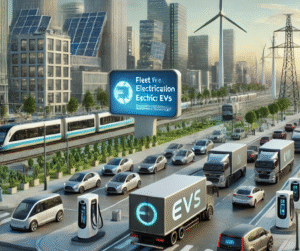The Europe electric bus market is undergoing rapid transformation as cities and governments strive to reduce carbon emissions and promote sustainable urban transport. With ambitious targets for carbon neutrality, stringent emission regulations, and growing environmental awareness, Europe is positioned as one of the leading regions for electric bus adoption. The market is supported by advancements in battery technology, charging infrastructure, and government incentives, enabling both cost efficiency and operational feasibility.

Market Dynamics
Emerging Europe Electric Bus Market Trends include ultra-fast depot charging, modular battery swapping, and integration into smart city mobility networks. Longer-range models are becoming more common, reducing operational limitations. Collaboration with energy providers and focus on lifecycle cost optimization are setting new standards for public transit electrification.
Regulatory Push and Policy Support
The European Union (EU) has set aggressive goals for carbon reduction under its Green Deal initiative, with zero-emission urban transport as a key pillar. Many countries, including Germany, France, the Netherlands, and the UK, have committed to phasing out diesel buses and promoting full-electric fleets by 2030–2040. Funding programs, subsidies, and low-interest loans further accelerate adoption.
Technological Advancements
Continuous improvements in lithium-ion and solid-state batteries, coupled with fast-charging and opportunity-charging systems, have enhanced the operational range and turnaround times for electric buses. Integration of telematics and fleet management software allows operators to optimize routes, monitor battery health, and improve energy efficiency.
Urbanization and Public Transport Demand
As European cities face rising congestion and environmental concerns, electric buses offer a practical solution for sustainable mobility. Demand is particularly strong in densely populated metropolitan areas where low-noise, zero-emission vehicles improve both environmental and social quality of life.
Market Trends
- Shift Toward Depot and Opportunity Charging
Cities are deploying mixed charging strategies, combining overnight depot charging with fast opportunity charging at bus stops or terminals to maximize fleet utilization. - Rising Adoption of Articulated and Double-Decker Electric Buses
Larger-capacity models are becoming popular to handle higher passenger volumes in busy urban areas, particularly in cities like London and Berlin. - Integration of Renewable Energy Sources
Some operators are incorporating solar-powered charging stations and renewable energy contracts to further reduce operational emissions. - Fleet Electrification by Private Operators
In addition to municipal fleets, private transport companies are investing heavily in electric buses to align with ESG goals and attract environmentally conscious passengers. - Battery Swapping and Modular Systems
Pilot projects in some European countries are exploring battery swapping systems for quicker turnaround, reducing downtime and charging congestion.
Key Market Drivers
- Stringent Emission Regulations
The EU’s commitment to climate neutrality by 2050 and urban low-emission zones are major catalysts for electric bus deployment. - Government Incentives and Funding
Initiatives such as the EU Clean Bus Deployment Initiative and national-level grants reduce the financial burden on fleet operators. - Advancements in Battery Technology
Improved energy density, faster charging, and longer life cycles are making electric buses more competitive with diesel models. - Lower Total Cost of Ownership (TCO)
Although the initial purchase cost remains higher, savings on fuel, maintenance, and tax benefits make electric buses financially viable in the long term. - Public Awareness and Environmental Goals
Growing consumer preference for eco-friendly transport encourages municipalities to adopt cleaner public mobility solutions.
Opportunities
- Charging Infrastructure Expansion
Developing smart, city-wide charging networks presents opportunities for technology providers, utility companies, and infrastructure investors. - Regional Collaborations
Cross-border initiatives can streamline procurement, reduce costs, and ensure interoperability of systems across Europe. - Integration with Smart Cities
Electric buses, when connected to IoT platforms and intelligent traffic systems, can enhance efficiency and passenger experience. - Emerging Eastern European Markets
While Western Europe leads adoption, countries in Eastern Europe represent untapped potential due to upcoming government programs and urban transport upgrades. - Hydrogen Fuel Cell Electric Buses (FCEBs)
In regions where long routes and heavy loads are common, hydrogen buses may complement battery electric fleets, opening up hybrid electrification opportunities.
Scope of the Market
The Europe electric bus market covers a diverse range of segments based on propulsion type (battery electric, plug-in hybrid, fuel cell), bus length (standard, articulated, mini/mid-size), and application (urban, intercity, airport shuttles). Urban buses account for the largest share due to the high demand for short-range, high-frequency services.
Key countries leading the market include:
- Germany – Strong investment in green mobility and nationwide infrastructure expansion.
- UK – Large-scale fleet replacement programs and emphasis on double-decker electric buses.
- Netherlands – High penetration of electric buses in public transport, supported by renewable energy integration.
- France – Aggressive urban mobility electrification targets and local manufacturing support.
- Nordic Countries – Rapid adoption driven by strong sustainability policies and cold-weather battery innovations.
Recent Developments
- BYD and Alexander Dennis Limited (ADL) expanded their partnership to supply hundreds of new electric buses to UK cities in 2024.
- Solaris Bus & Coach secured major contracts in Germany and Spain for articulated electric buses with extended range.
- VDL Bus & Coach launched a next-generation electric bus with increased battery capacity and faster charging capabilities.
- The EU’s Connecting Europe Facility allocated funding for transnational charging infrastructure to support cross-border fleet operations.
- Irizar e-mobility introduced modular charging systems for European cities with mixed fleet needs.
Conclusion
The Europe electric bus market is poised for significant growth over the next decade, driven by stringent emission regulations, supportive government policies, and rapid technological advancements. While initial costs and infrastructure challenges remain, the long-term benefits in terms of sustainability, efficiency, and cost savings are compelling for both public and private operators.
As European cities continue to embrace electric mobility, the electric bus will play a central role in shaping a cleaner, quieter, and more efficient urban transport system. The next few years will likely witness large-scale fleet replacements, technological breakthroughs in batteries and charging, and stronger integration with renewable energy systems — marking a decisive step toward carbon-free public transportation.


